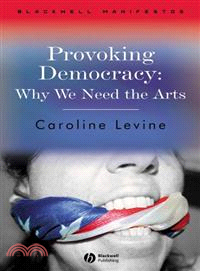Provoking Democracy - Why We Need The Arts
商品資訊
ISBN13:9781405159272
出版社:John Wiley & Sons Inc
作者:Levine
出版日:2007/07/27
裝訂/頁數:平裝/272頁
商品簡介
作者簡介
名人/編輯推薦
目次
相關商品
商品簡介
A provocative and compelling book that explores the complex relationship between democracy and avant-garde art, offering a surprising new perspective on the critical role that the arts play in democratic governance at home and abroad.
Covers a broad range of topics, from disputes over public art, copyright, and obscenity, to the operations of the House Un-American Activities Committee during the Cold War
Highlights detailed and at times shocking debates over the role of the rebellious artist within society
Covers a broad range of topics, from disputes over public art, copyright, and obscenity, to the operations of the House Un-American Activities Committee during the Cold War
Highlights detailed and at times shocking debates over the role of the rebellious artist within society
作者簡介
Caroline Levine is Associate Professor of English at the University of Wisconsin-Madison. A specialist on relations between art and politics, she is author of The Serious Pleasures of Suspense, which won the Perkins Prize for the best contribution to narrative studies in 2004. She has co-edited three collections of essays, including a special issue of The Journal of Popular Culture on the politics of pleasurable reading, and has published articles on a range of writers and artists, including John Ruskin, Elizabeth Barrett Browning, Charlotte Bronte, Andreas Gursky, and Richard Serra.
名人/編輯推薦
“In a highly original work that is itself often provocative, Levine explores the mutual interactions between democracy and provocative art. The book's strength lies in its insightful reading of these debates in terms of their underlying democratic-theoretical premises. Recommended.” Choice
"Yes, democracies need art, especially art they don't like or understand and Caroline Levine's shrewd, eloquent and often entertaining Provoking Democracy tells us why. From the controversies swirling around the defacement of Jacob Epstein’s “Rima” and the demolition of Serra’s “Tilted Arc” to the obscenity trials of Lady Chatterley’s Lover and 2 Live Crew, Levine shows how the avant garde helps defend democracies from its worse excesses--the muting of marginal voices, the oppression of majority rule, and the blind conformism of consensus politics. Indeed Levine is to be commended for negotiating an honorable truce in the culture wars. Her important new work recognizes not just the right but also the obligations of the avant garde to act as a permanent minority working within democratic institutions to ensure a more open and genuinely plural society."
Maria DiBattista, Princeton University
"Provoking Democracy should be mandatory reading… certainly in college, if not in high school. I think every educator, every superintendent, every school board, should have a copy of this book by their side, should read it, should understand it, should have dialogues about it, should debate it - because ultimately we’re talking about engaging the creative minds of those yet to come."
Tony Trupiano (“The Tony Trupiano Show”)
"In these increasingly barbarous times, it is good and refreshing to see work that stands up for the provocative - and potentially emancipatory - powers of the arts. Caroline Levine's wide-ranging and serious engagement with the question of how the arts might provoke or even promote democracy, and her realisation that this question is itself fundamental for us, is a timely and much-needed rejoinder to the brutish dimensions of contemporary polities."
Thomas Docherty, University of Warwick (author of Aesthetic Democracy)
"Caroline Levine’s Provoking Democracy gives an extremely compelling account of how Anglo-American law has, in counterintuitive ways, supported “avant garde” art, and why Anglo-American democracies depend, in turn, upon such art, which provides a dissident voice that pluralism and an orientation towards the future demand. Covering a broad range of topics, from public involvement in decisions about whether particular pieces of art should be displayed, to the operations of the House Un-American Activities Committee during the Cold War, to the role of originality in judicial determinations of what counts as art, Levine’s book furnishes ingenious readings of the dynamic interplay between particular figures and events. In the course of reading Provoking Democracy, one is shocked at how the CIA secretly funded the work of Abstract Expressionist painter Jackson Pollock to promote the ideal of American freedom internationally at the same time as American publics and media reviled his painting, but one also laughs at how customs officials categorized Constantin Brancusi’s sculpture “Bird” as a kitchen implement. All of these revelations are conveyed in a pellucid and gripping narrative style. Provoking Democracy is a book that anyone interested in democracy or the arts simply must read."
Bernadette Meyler, Cornell University Law School
“Levine is adept at selecting eye-catching instances revealing of the paradoxes that she argues are at the heart of liberal democracy itself.”
Times Higher Education
"This is an impressively researched and well-referenced book."
Arts Professional
“Impressively researched and well-referenced … .Connects grand theories … to everyday experiences of the arts. Valuable for both policy-makers, and more general readerships." Demos.co.uk
"Yes, democracies need art, especially art they don't like or understand and Caroline Levine's shrewd, eloquent and often entertaining Provoking Democracy tells us why. From the controversies swirling around the defacement of Jacob Epstein’s “Rima” and the demolition of Serra’s “Tilted Arc” to the obscenity trials of Lady Chatterley’s Lover and 2 Live Crew, Levine shows how the avant garde helps defend democracies from its worse excesses--the muting of marginal voices, the oppression of majority rule, and the blind conformism of consensus politics. Indeed Levine is to be commended for negotiating an honorable truce in the culture wars. Her important new work recognizes not just the right but also the obligations of the avant garde to act as a permanent minority working within democratic institutions to ensure a more open and genuinely plural society."
Maria DiBattista, Princeton University
"Provoking Democracy should be mandatory reading… certainly in college, if not in high school. I think every educator, every superintendent, every school board, should have a copy of this book by their side, should read it, should understand it, should have dialogues about it, should debate it - because ultimately we’re talking about engaging the creative minds of those yet to come."
Tony Trupiano (“The Tony Trupiano Show”)
"In these increasingly barbarous times, it is good and refreshing to see work that stands up for the provocative - and potentially emancipatory - powers of the arts. Caroline Levine's wide-ranging and serious engagement with the question of how the arts might provoke or even promote democracy, and her realisation that this question is itself fundamental for us, is a timely and much-needed rejoinder to the brutish dimensions of contemporary polities."
Thomas Docherty, University of Warwick (author of Aesthetic Democracy)
"Caroline Levine’s Provoking Democracy gives an extremely compelling account of how Anglo-American law has, in counterintuitive ways, supported “avant garde” art, and why Anglo-American democracies depend, in turn, upon such art, which provides a dissident voice that pluralism and an orientation towards the future demand. Covering a broad range of topics, from public involvement in decisions about whether particular pieces of art should be displayed, to the operations of the House Un-American Activities Committee during the Cold War, to the role of originality in judicial determinations of what counts as art, Levine’s book furnishes ingenious readings of the dynamic interplay between particular figures and events. In the course of reading Provoking Democracy, one is shocked at how the CIA secretly funded the work of Abstract Expressionist painter Jackson Pollock to promote the ideal of American freedom internationally at the same time as American publics and media reviled his painting, but one also laughs at how customs officials categorized Constantin Brancusi’s sculpture “Bird” as a kitchen implement. All of these revelations are conveyed in a pellucid and gripping narrative style. Provoking Democracy is a book that anyone interested in democracy or the arts simply must read."
Bernadette Meyler, Cornell University Law School
“Levine is adept at selecting eye-catching instances revealing of the paradoxes that she argues are at the heart of liberal democracy itself.”
Times Higher Education
"This is an impressively researched and well-referenced book."
Arts Professional
“Impressively researched and well-referenced … .Connects grand theories … to everyday experiences of the arts. Valuable for both policy-makers, and more general readerships." Demos.co.uk
目次
Preface.
1. Democracy Meets the Avant-Garde.
2. The People v. the Arts.
3. Propaganda for Democracy: The Avant-Garde Goes to War.
4. Obscenity and the Democratization of Culture.
5. Originality on Trial.
Conclusion: Artists, Academic Writing, and the Classroom.
Notes.
Index.
.
1. Democracy Meets the Avant-Garde.
2. The People v. the Arts.
3. Propaganda for Democracy: The Avant-Garde Goes to War.
4. Obscenity and the Democratization of Culture.
5. Originality on Trial.
Conclusion: Artists, Academic Writing, and the Classroom.
Notes.
Index.
.
主題書展
更多
主題書展
更多書展今日66折
您曾經瀏覽過的商品
購物須知
外文書商品之書封,為出版社提供之樣本。實際出貨商品,以出版社所提供之現有版本為主。部份書籍,因出版社供應狀況特殊,匯率將依實際狀況做調整。
無庫存之商品,在您完成訂單程序之後,將以空運的方式為你下單調貨。為了縮短等待的時間,建議您將外文書與其他商品分開下單,以獲得最快的取貨速度,平均調貨時間為1~2個月。
為了保護您的權益,「三民網路書店」提供會員七日商品鑑賞期(收到商品為起始日)。
若要辦理退貨,請在商品鑑賞期內寄回,且商品必須是全新狀態與完整包裝(商品、附件、發票、隨貨贈品等)否則恕不接受退貨。
























